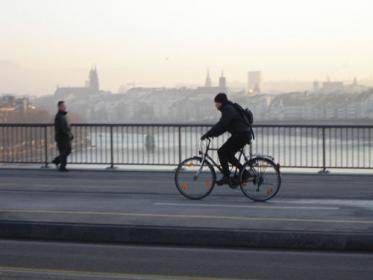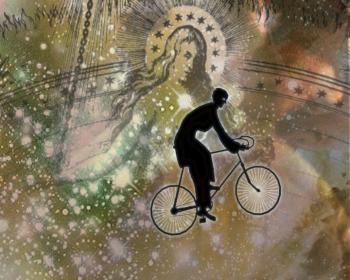He Has Ridden!
A visit to the site of Hofmann's famous bicycle ride on the occasion of his 100th birthday
Jan 2006 (Published on Erowid Apr 2012)
Originally posted to Nomadology.
Citation: Razam R. "He Has Ridden". Erowid.org. Jan 2006 / Apr 2012.
I've come to Switzerland to meet a 100 year old man. That might be cause enough in some circles, but this is no ordinary centenarian. Dr. Albert Hofmann is the Swiss chemist, ex-Nobel Prize committee member, who discovered the unique properties of d-lysergic acid diethylamide, known as LSD (or "acid" on the street) in his lab at Sandoz pharmaceuticals in April, 1943.
Basel, the city where all this occurred, is proud of it's prize chemist and is hosting an international Symposium on "LSD - Problem Child and Wonder Drug". On Wednesday 11th Jan, the local paper is awash with respect for Dr. Hofmann and his discovery in a way that no other Western newspaper would. An eight page spread documents his discovery, quotes excerpts from his book, "My Problem Child", and charts the take-up of LSD by the Hippies in the 60s and it's effect on music, culture and consciousness. Bloody great.
Later I'm talking about the cultural conceits with a group of 'Heads', to use the '60s term - switched on crew that are all here for the LSD conference, too. The classic media formula when talking about "drug" issues is rise and fall. Apart from a select few archetypes - like Kate Moss or Robbie Williams, for instance, who are allowed to get away with their indulgences, the usual route for people who indulge in drugs is that they must always come to a bad end.
Basel, however, will have none of this manichean dualism. The city has hundreds of years of balanced thought and philosophy hanging in their culture milieu. Posters for psychoanalysis sessions adorn the local bus stops. Picasso, Freud, and Mozart exhibitions are on permanent display. The European mind has a long history examining itself, and the use of a chemical like LSD to navigate the labyrinth of the unconscious seems de rigeur in this place. Not that it's legal--but for medical and psychotherapy uses the culture seems totally comfortable with it's potential and proud of its native discoverer.
To celebrate Dr. Hofmann's 100th birthday today I decide to put myself in his shoes and recreate the famous bike ride he took that fateful day, April 19, 1943 - sans the acid.
I hire a bike and ride to Basel St. Johann, on the edge of the Rhine, where Sandoz labs used to be. Sandoz merged with Ciba-Novartis in the 1990s, and is now one of the largest pharmaceutical giants in the world. The old labs where LSD was synthesised are gone and a giant, thirty story tower stands over the river, dominating the Basel cityscape. This is the heavy industrial side of town and the docks area where ships unload their goods for all the factories spotted along the river.
As I walk along in the late afternoon a light mist takes hold, catching the rays of sun and the pollution let off by the two giant industrial chimneys in the distance. They look like colossal salt and pepper shakers spewing out clouds of gas day and night into the Basel sky. Curious and curiouser this town and the price it pays for it's libertarian consciousness.
I walk past a huge block of commission flats about a hundred metres long and eight stories high, home to the immigrants Basel has accepted in the last few decades. Kids play football in a nearby park, laughing happily and rugged up against the cold.
Passing under the bridge I notice a plush black armchair, empty water bottles, and litter, syringe caps. Illegal injectable street drugs have come to Basel, too - just like everywhere else in the world. The ironic thing is that this is also the pharmaceutical capital of the country, where legal drugs are manufactured and shipped out to the waiting world.
Ironic, then, that LSD is still banned, grouped with all the other street drugs when it originally came from the research labs and doctors offices. In its heyday it was used to treat personality disorders, alcoholism and a raft of mental issues for the elites.
Writers like Aldous Huxley, professors like Timothy Leary, then a respected Harvard professor, scientists like Francis Crick, co-discoverer of DNA, actors like Carey Grant - the rumour mill even extended it's use to Marilyn Munroe and JFK. If one understands the set and setting of those times, the late 50s and early 60s, before all the drug hysteria, one could quite reasonably believe everyone was doing it. The intelligentsia of the world was being switched on and dosing one another in a chemical network from Europe to America.
Over 40,000 people were treated successfully worldwide with LSD as a psychotherapy and consciousness raising tool by the time it was finally banned in 1966 amongst threats of cultural revolution.
I wonder what Basel would have looked like over sixty years ago, back in the middle of the Second World War when Dr. Hofmann made his momentous discovery. There are enough grand old buildings still around with their gothic architecture to carry the European charm into the 21st century, but they are surrounded by skyscrapers and traffic intersections hosting trams, buses and cars. And of course, bicycles everywhere.
The Swiss love their bikes, it seems. The Novartis tower has a giant bike shed opposite the Rhine for its employees, with at least a hundred bikes all secured under cover.Which seems appropriate, as in 1943 the good Doctor was forced to travel home by bicycle (cars being limited due to war-time shortages) after his first deliberate dosing with LSD.
At about twenty minutes past four in the afternoon, Dr. Hofmann dissolved 250 mg of LSD-25 in water, what he thought would be a small dose, and drank it.
By 4:50 pm he had noticed no effects. By 5:00 pm, he noted the following symptoms in his journal: "beginning dizziness, feeling of anxiety, unrest, difficulty in concentration, visual disturbances, desire to laugh." His last written words were barely legible.
"I requested my laboratory technician to accompany me home; we went by bicycle. My field of vision swayed before me, and objects appeared distorted like images in curved mirrors. I had the impression of being unable to move from the spot, although my assistant told me afterwards that we had cycled at a good pace.
I noticed with dismay that my environment was undergoing progressive changes. Space and time became more and more disorganized and I was overcome by a fear that I was going out of my mind. The worst part of it being that I was clearly aware of my condition. I was not, however, capable by any act of will, of preventing the breakdown of the world around me."
I'm standing on the Drelrosenbrucke bridge, the same one Dr. Hofmann rode over all those years ago, when a nearby clock strikes 5:00 pm. The sun is setting in streaks of pink and grey as dozens of cyclists cross the bridge in front of Sandoz -Novartis in both directions.
I picture Albert, stoned out of his gourd on LSD, pedaling away into hyperspace and the history books. Oh, those days of chemical innocence, before the War on Drugs, before we knew as a culture what these things do, the places they take us to and the deep connection they can make to ourselves and the higher planes.
And as the psychedelic bicyclist in my mind's eye crests the bridge and rides off towards his home in Bottmingen, down near the zoo, a strange presentiment comes over me, a connection with the good Doctor and his legion of tripper children and grand-children down through the ages.
The trip began in earnest that Monday afternoon in 1943, right here in Basel. But if truth be told, it never ended. For once the door of perception is open, it's mighty hard to close.
Basel, the city where all this occurred, is proud of it's prize chemist and is hosting an international Symposium on "LSD - Problem Child and Wonder Drug". On Wednesday 11th Jan, the local paper is awash with respect for Dr. Hofmann and his discovery in a way that no other Western newspaper would. An eight page spread documents his discovery, quotes excerpts from his book, "My Problem Child", and charts the take-up of LSD by the Hippies in the 60s and it's effect on music, culture and consciousness. Bloody great.

|
Basel, however, will have none of this manichean dualism. The city has hundreds of years of balanced thought and philosophy hanging in their culture milieu. Posters for psychoanalysis sessions adorn the local bus stops. Picasso, Freud, and Mozart exhibitions are on permanent display. The European mind has a long history examining itself, and the use of a chemical like LSD to navigate the labyrinth of the unconscious seems de rigeur in this place. Not that it's legal--but for medical and psychotherapy uses the culture seems totally comfortable with it's potential and proud of its native discoverer.

|
I hire a bike and ride to Basel St. Johann, on the edge of the Rhine, where Sandoz labs used to be. Sandoz merged with Ciba-Novartis in the 1990s, and is now one of the largest pharmaceutical giants in the world. The old labs where LSD was synthesised are gone and a giant, thirty story tower stands over the river, dominating the Basel cityscape. This is the heavy industrial side of town and the docks area where ships unload their goods for all the factories spotted along the river.
As I walk along in the late afternoon a light mist takes hold, catching the rays of sun and the pollution let off by the two giant industrial chimneys in the distance. They look like colossal salt and pepper shakers spewing out clouds of gas day and night into the Basel sky. Curious and curiouser this town and the price it pays for it's libertarian consciousness.

|
Passing under the bridge I notice a plush black armchair, empty water bottles, and litter, syringe caps. Illegal injectable street drugs have come to Basel, too - just like everywhere else in the world. The ironic thing is that this is also the pharmaceutical capital of the country, where legal drugs are manufactured and shipped out to the waiting world.
Ironic, then, that LSD is still banned, grouped with all the other street drugs when it originally came from the research labs and doctors offices. In its heyday it was used to treat personality disorders, alcoholism and a raft of mental issues for the elites.

|
Over 40,000 people were treated successfully worldwide with LSD as a psychotherapy and consciousness raising tool by the time it was finally banned in 1966 amongst threats of cultural revolution.
I wonder what Basel would have looked like over sixty years ago, back in the middle of the Second World War when Dr. Hofmann made his momentous discovery. There are enough grand old buildings still around with their gothic architecture to carry the European charm into the 21st century, but they are surrounded by skyscrapers and traffic intersections hosting trams, buses and cars. And of course, bicycles everywhere.

|
At about twenty minutes past four in the afternoon, Dr. Hofmann dissolved 250 mg of LSD-25 in water, what he thought would be a small dose, and drank it.
By 4:50 pm he had noticed no effects. By 5:00 pm, he noted the following symptoms in his journal: "beginning dizziness, feeling of anxiety, unrest, difficulty in concentration, visual disturbances, desire to laugh." His last written words were barely legible.
"I requested my laboratory technician to accompany me home; we went by bicycle. My field of vision swayed before me, and objects appeared distorted like images in curved mirrors. I had the impression of being unable to move from the spot, although my assistant told me afterwards that we had cycled at a good pace.
I noticed with dismay that my environment was undergoing progressive changes. Space and time became more and more disorganized and I was overcome by a fear that I was going out of my mind. The worst part of it being that I was clearly aware of my condition. I was not, however, capable by any act of will, of preventing the breakdown of the world around me."
I'm standing on the Drelrosenbrucke bridge, the same one Dr. Hofmann rode over all those years ago, when a nearby clock strikes 5:00 pm. The sun is setting in streaks of pink and grey as dozens of cyclists cross the bridge in front of Sandoz -Novartis in both directions.
I picture Albert, stoned out of his gourd on LSD, pedaling away into hyperspace and the history books. Oh, those days of chemical innocence, before the War on Drugs, before we knew as a culture what these things do, the places they take us to and the deep connection they can make to ourselves and the higher planes.
And as the psychedelic bicyclist in my mind's eye crests the bridge and rides off towards his home in Bottmingen, down near the zoo, a strange presentiment comes over me, a connection with the good Doctor and his legion of tripper children and grand-children down through the ages.
The trip began in earnest that Monday afternoon in 1943, right here in Basel. But if truth be told, it never ended. For once the door of perception is open, it's mighty hard to close.


